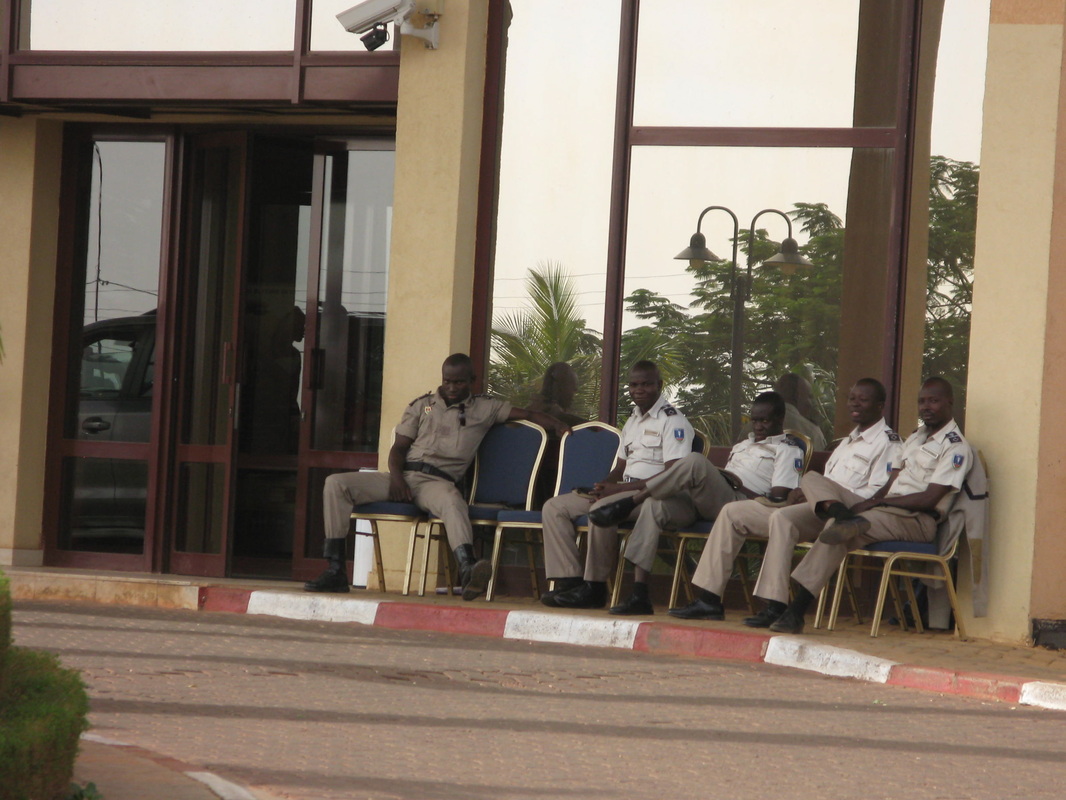Well, Burkina Faso was crazy and my grades this semester may suffer due to skipping the eight final days of the semester, but, in my humble opinion, grades<conferences. Anyway, here are some reflections from the trip and the African Union Population Studies conference:
1. When you've got more labor than capital, use labor. The ridiculously luxurious conference location, Hotel Laico, was a strange sight in the middle of one of the poorest countries in the world (by HDI). Though the large surplus of labor in the country meant the hotel had plenty of security guards, elevator operators and hostesses. I couldn't tell if I should feel safer because of all the security or rather concerned. The six guards above spent most of their time out front of the hotel texting when they weren't posing for my photos.
2. Family planning is important, but so complex. Given that this conference was about population studies (which draws an interdisciplinary crowd of sociologists, economists, demographers and public health researchers), family planning was everywhere. As related to my previous post about husbands wanting larger family size, there was an ENTIRE session about male roles in family planning. While I thought (because of the Ashraf et al results) that men always wanted larger families, and involving them in family planning would be ineffective, it turns out that a very similar experiment was run in Ethiopia where the result was the exact opposite. Men wanted smaller families (more modern contraceptives) and women wanted larger families. So the question on the role of husbands still stands.
3. Hanging out with smart people is a fantastic way to become smart. The best part of this conference was that I got to meet some really intelligent people doing such innovative research. David Lam and Laura Zimmermann are the huge supporter of IPUMS-I and use our data for their research on the elderly in Sub-Saharan Africa. Rebecca Thornton and Susan Godlonton have published on the peer effects of learning HIV results and will be starting a project using community health workers in family planning next year (!). I also really liked Sandrine Koissy-Kpein's presentation on the result of intra-household bargaining on gender biases in education. And lastly, Sara Randall called into question the notion of a household in household surveys.
4. Why should I care about your research? It turns out that at the African Union Population Studies conference, presenters thoroughly explain the motivation for their research. The reasons one should care about development and population are so real when you're in Burkina Faso: poverty, inequality, corruption, high fertility rates, poor education and seriously lacking healthcare. However, many of the presentations focused so much on why I should care (and frankly, they were preaching to the choir), that data, research methodologies and critical discussions were lacking. At the same time, I learned from this experience that a lot of the research I've seen in the U.S. is actually missing the part about why I should care. In fact, fellow American researchers, this is the most important part.
1. When you've got more labor than capital, use labor. The ridiculously luxurious conference location, Hotel Laico, was a strange sight in the middle of one of the poorest countries in the world (by HDI). Though the large surplus of labor in the country meant the hotel had plenty of security guards, elevator operators and hostesses. I couldn't tell if I should feel safer because of all the security or rather concerned. The six guards above spent most of their time out front of the hotel texting when they weren't posing for my photos.
2. Family planning is important, but so complex. Given that this conference was about population studies (which draws an interdisciplinary crowd of sociologists, economists, demographers and public health researchers), family planning was everywhere. As related to my previous post about husbands wanting larger family size, there was an ENTIRE session about male roles in family planning. While I thought (because of the Ashraf et al results) that men always wanted larger families, and involving them in family planning would be ineffective, it turns out that a very similar experiment was run in Ethiopia where the result was the exact opposite. Men wanted smaller families (more modern contraceptives) and women wanted larger families. So the question on the role of husbands still stands.
3. Hanging out with smart people is a fantastic way to become smart. The best part of this conference was that I got to meet some really intelligent people doing such innovative research. David Lam and Laura Zimmermann are the huge supporter of IPUMS-I and use our data for their research on the elderly in Sub-Saharan Africa. Rebecca Thornton and Susan Godlonton have published on the peer effects of learning HIV results and will be starting a project using community health workers in family planning next year (!). I also really liked Sandrine Koissy-Kpein's presentation on the result of intra-household bargaining on gender biases in education. And lastly, Sara Randall called into question the notion of a household in household surveys.
4. Why should I care about your research? It turns out that at the African Union Population Studies conference, presenters thoroughly explain the motivation for their research. The reasons one should care about development and population are so real when you're in Burkina Faso: poverty, inequality, corruption, high fertility rates, poor education and seriously lacking healthcare. However, many of the presentations focused so much on why I should care (and frankly, they were preaching to the choir), that data, research methodologies and critical discussions were lacking. At the same time, I learned from this experience that a lot of the research I've seen in the U.S. is actually missing the part about why I should care. In fact, fellow American researchers, this is the most important part.

 RSS Feed
RSS Feed